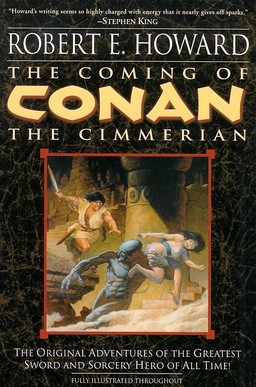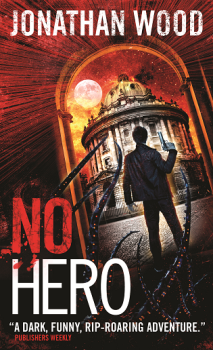Conan in Manhattan: The Relationship Between Urban Fantasy and Sword and Sorcery
 Urban fantasy? You mean that genre where everyone gets to shag a vampire? What the hell has that got to do with fighting off the corruption of civilization with only a broadsword and a loincloth? At least, that’s pretty much where my head was at a few months before I started writing No Hero.
Urban fantasy? You mean that genre where everyone gets to shag a vampire? What the hell has that got to do with fighting off the corruption of civilization with only a broadsword and a loincloth? At least, that’s pretty much where my head was at a few months before I started writing No Hero.
See, I never really expected to write an urban fantasy novel. Except now I’m on my fourth…
Back when I started writing my first urban fantasy novel, No Hero, what I really wanted to capture was my love of the old pulps, to create some good old-fashioned two-fisted action. Men of moral fiber refusing to bow down and be beaten. I was flailing around for a way to channel that when a friend said to me, “You know, urban fantasy is just sword and sorcery with a modern day setting.”
Now, obviously this is a slightly problematic statement. But as I thought about it, I realized the argument had more heft than I’d originally considered.
In an article in this magazine, “The Demarcation of Sword and Sorcery,” Joseph A McCullough V lays forward a pretty clear blueprint for the subgenere. First he deals with characters, stating that they are: 1) self-motivated, 2) outsiders, and 3) of heroic stature.
The first two of those characteristics are perhaps taken best together. The quintessential urban fantasy character is probably the private investigator. By definition these are outsiders: they are not part of any larger legal organization, they operate alone or within a small support network of other loners and social oddities, and they are outside of the world they investigate. They stand apart from the criminals they pursue. What’s more, they are self-motivated: they decide the cases they take. They decide how to pursue them. While not all characters are private detectives (none of mine are), they do all tend to share these traits (yep, I’m covered).
 The issue of heroic stature is a little more problematic. Urban fantasy characters live in the 21st century, a far more neurotic time than the ages harkened back to by authors like Howard and Lieber. The true sword and sorcery protagonists of the modern age are perhaps superheroes, who can be convinced of their own greatness without irony. The typical urban fantasy protagonist is not a superhero. He or she is instead far more uncertain about their place in the world. However, while “heroic stature” is not usually the starting point for your typical urban fantasy protagonist, it is more often than not the end of their journey. While my own protagonist, Arthur Wallace, certainly doesn’t start out as a hero, he gets there in the end (In book two, I even managed to give him a flaming sword to kick ass with, because really, if you can, why wouldn’t you?)
The issue of heroic stature is a little more problematic. Urban fantasy characters live in the 21st century, a far more neurotic time than the ages harkened back to by authors like Howard and Lieber. The true sword and sorcery protagonists of the modern age are perhaps superheroes, who can be convinced of their own greatness without irony. The typical urban fantasy protagonist is not a superhero. He or she is instead far more uncertain about their place in the world. However, while “heroic stature” is not usually the starting point for your typical urban fantasy protagonist, it is more often than not the end of their journey. While my own protagonist, Arthur Wallace, certainly doesn’t start out as a hero, he gets there in the end (In book two, I even managed to give him a flaming sword to kick ass with, because really, if you can, why wouldn’t you?)
Having dealt with character, McCullough moves onto the scope and scale of Sword and Sorcery. The heroes of S&S novels aren’t battling to save all of reality. They aren’t fulfilling great destinies. They are are trying to work out how many men they need to punch in the nuts in order to steal the diamond and get the girl. (I’m paraphrasing Mr. McCullough a little.)
Again Urban Fantasy, for the most part, gets a passing grade. These are small scale conflicts within the larger scope of life’s battle. They are stories of people struggling to get to the next day. Except there’s a mind-flaying alien on the subway. There’s a murder victim whose head has been sliced off with animal claws.
Is Urban Fantasy a pure translation of Sword and Sorcery? Is it just the scenery that’s changed? No. Its feet are too firmly planted in the preoccupations and neuroses of modern life. But it’s a closer cousin than it may first appear. It’s a subgenre that hasn’t forgotten its pulp roots. And, by Crom, it’s a subgenre that’s usually worth a second glance.
Jonathan Wood is an Englishman in New York. His debut novel, No Hero, was described by Publisher’s Weekly as “a funny, dark, rip-roaring adventure with a lot of heart, highly recommended for urban fantasy and light science fiction readers alike.” Barnesandnoble.com listed it has one of the 20 best paranormal fantasies of the past decade, and Charlaine Harris, author of the Sookie Stackhouse novels described it as, “so funny I laughed out loud.” He can be found online at jonathanwoodauthor.com
Great post Jonathan! And agreed – I see S&S firmly entrenched in a vast majority of our modern entertainment, literary and not, from Urban Fantasy to WWE to numerous current and popular movies.